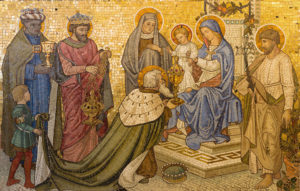Even now, says the LORD,
return to me with your whole heart,
with fasting, and weeping, and mourning;
Rend your hearts, not your garments,
and return to the LORD, your God.
For gracious and merciful is he,
slow to anger, rich in kindness,
and relenting in punishment. (Joel 2:12-13)
This was the first reading for Ash Wednesday. God speaks to us through Scripture and also through the natural world. It is no coincidence that Lent begins in the winter and yields to Easter in the Spring. God uses these cycles to call us back to Him, to deepen our connection to Him. If we approach Lent the way we approach a garden, we can yield beautiful flowers in the garden of our hearts.
First, we begin with weeding. The biggest weed is gossip. Weeding needs to continually be looked after just as we need to continually mind what comes out of our mouths. This is difficult for all of us, but we can ask St. Joseph for help with this. St. Joseph had a major secret – his betrothed was pregnant and the baby wasn’t his. He was devastated by this, but instead of telling anyone, he kept it to himself, preserving Mary’s reputation. In the end he found out that he had misjudged the situation, but he had caused no harm to Mary in the process. Gossip is difficult to overcome, especially when we think we are in the right, but St. Joseph can teach us how to receive the gift of silence.
Second, we must get rid of all the large rocks in our garden. Some of them are quite big and heavy because as we carry resentment for past wrongs the rocks grow larger and heavier with each passing year. Forgiveness cannot be achieved alone, so St. Theresa of Calcutta is there to help. She would often beg for food for the poor. One day she brought a child into a bakery and asked for bread. The shopkeeper spit in her face. She calmly said, “Thank you for that gift for me. Now how about some bread for this child?” The child received the bread. She understands well how to react with humility and forgiveness in the face of wrongdoing and she can help us get rid of those rocks.
We must then add amendments to our soil so it will be a healthy place for our plants. Even after forgiving others, some wounds are very deep and still need healing. Psychologists say that the greatest thing they do for their patients is listening to them. In our culture listening is a lost art. How often have we tried to have a meaningful conversation with someone who was constantly checking every alert on their cell phone? How often have we done that to others? To heal these deep wounds, we need to take them to Jesus in the Blessed Sacrament. Spending time with Him in the silence, pouring our hearts out to Him and giving Him time to speak to our hearts when we are silent and listening to Him, allows Him to heal these wounds. He will ask us to pray for those who caused the wounds, but this is part of our healing process so it needs to be done.
We are then ready to plant our seeds. Almsgiving and acts of kindness and charity are the best seeds to plant because they are not only planted in our hearts, but also in the hearts of those around us. Water the garden thoroughly with prayer, especially the Rosary. Gentle pruning is required as well, so we fast to help us get rid of those bad habits that keep wanting to grow back.
Just as flowers need to be fed, our “miracle-gro” is frequent reception of the Eucharist, daily if possible, and Confession. When Easter arrives our daffodils will bring us joy as they blossom and our roses will bring us peace when they bloom. Those around us will also enjoy the beauty of our garden, but most importantly, Jesus will join us on our porch swing and make His home with us.






What a beautiful meditation as we begin the season of Lent and tend the gardens of our hearts.
Thank you, LisaMarie.